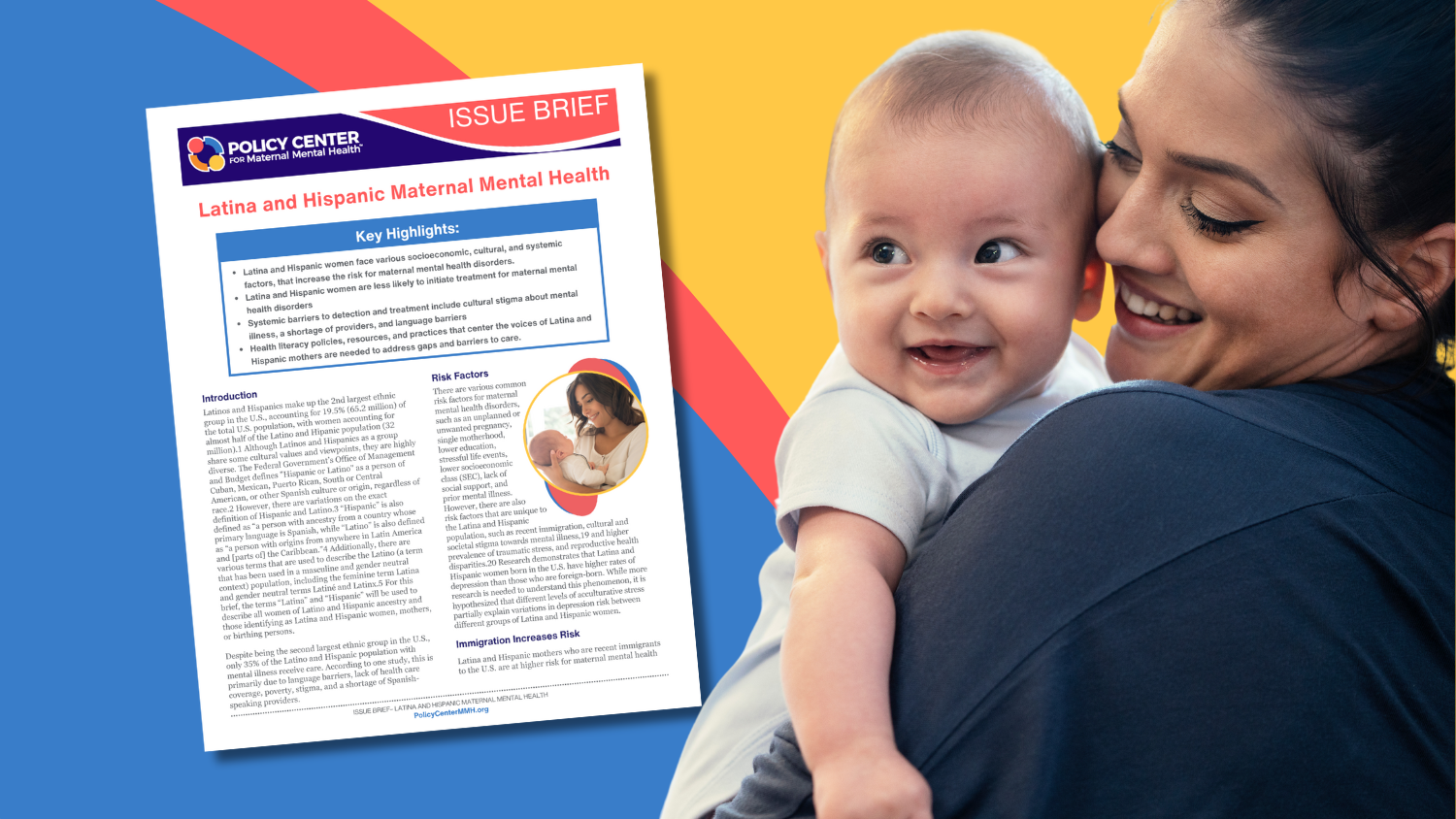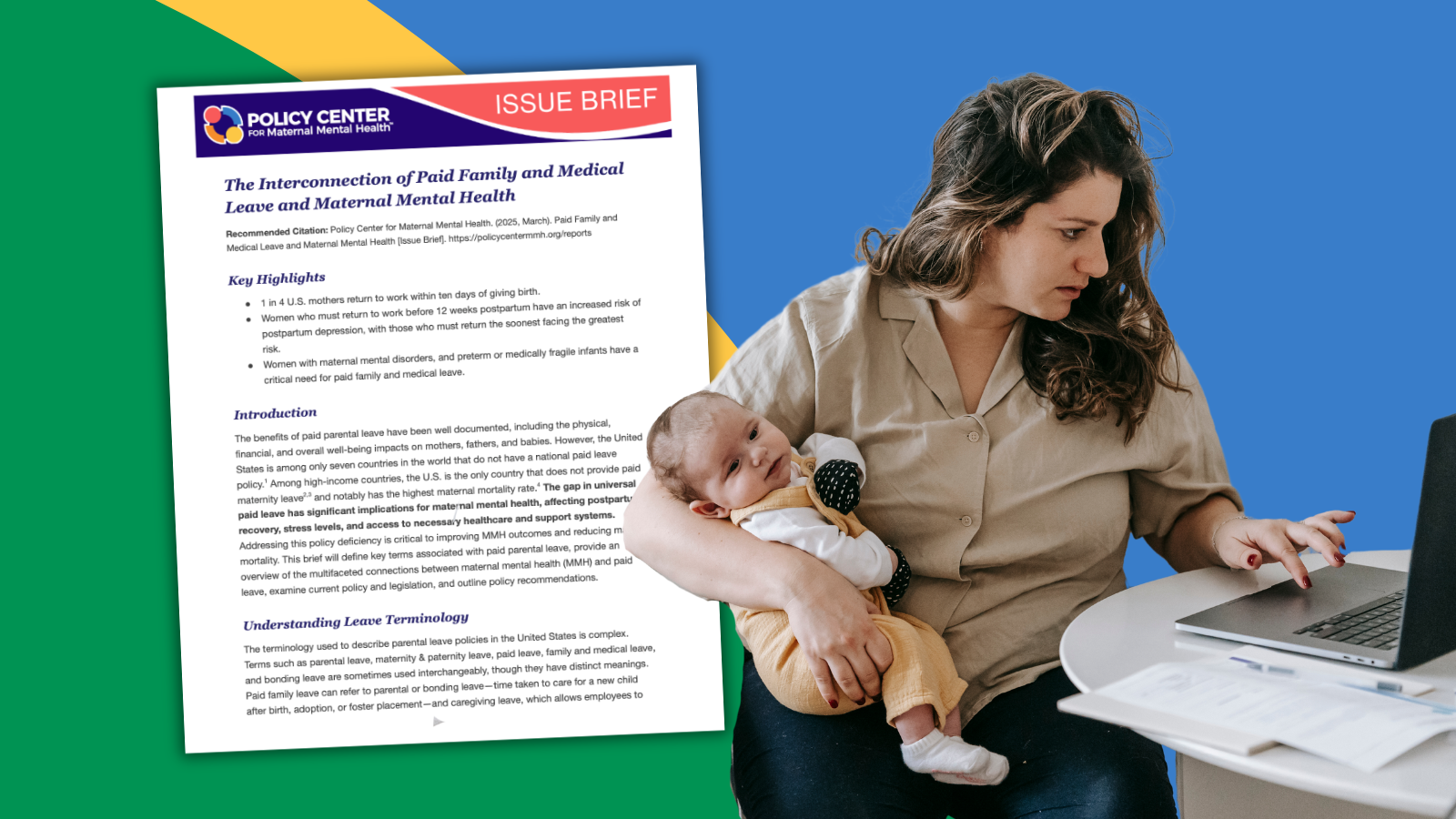Key Highlights
- Latina and Hispanic women face various socioeconomic, cultural, and systemic factors, that increase the risk for maternal mental health disorders.
- Latina and Hispanic women are less likely to initiate treatment for maternal mental health disorders
- Systemic barriers to detection and treatment include cultural stigma about mental illness, a shortage of providers, and language barriers
- Health literacy policies, resources, and practices that center the voices of Latina and Hispanic mothers are needed to address gaps and barriers to care.
Introduction

Latinos and Hispanics make up the 2nd largest ethnic group in the U.S., accounting for 19.5% (65.2 million) of the total U.S. population, with women accounting for almost half of the Latino and Hipanic population (32 million).1 Although Latinos and Hispanics as a group share some cultural values and viewpoints, they are highly diverse. The Federal Government’s Office of Management and Budget defines “Hispanic or Latino” as a person of Cuban, Mexican, Puerto Rican, South or Central American, or other Spanish culture or origin, regardless of race.2 However, there are variations on the exact definition of Hispanic and Latino.3 “Hispanic” is also defined as “a person with ancestry from a country whose primary language is Spanish, while “Latino” is also defined as “a person with origins from anywhere in Latin America and [parts of] the Caribbean.”4 Additionally, there are various terms that are used to describe the Latino (a term that has been used in a masculine and gender neutral context) population, including the feminine term Latina and gender neutral terms Latiné and Latinx.5 For this brief, the terms “Latina” and “Hispanic” will be used to describe all women of Latino and Hispanic ancestry and those identifying as Latina and Hispanic women, mothers, or birthing persons.
Despite being the second largest ethnic group in the U.S., only 35% of the Latino and Hispanic population with mental illness receive care. According to one study, this is primarily due to language barriers, lack of health care coverage, poverty, stigma, and a shortage of Spanish-speaking providers.6 Up to 40% of Latina and Hispanic women giving birth will experience a maternal mental health disorder such as maternal depression.7 Various factors at societal, cultural, and economic levels increase the risk of maternal mental health disorders for Latina and Hispanic women.7 Political factors such as immigration policies and immigration status8 and fear associated with legal systems increase distress and risk for mental health conditions9,10 and discourage individuals from seeking health care. System-level factors that affect access to care include limited health insurance coverage, limited language and culturally congruent treatment approaches, and sensitive resources and systems of care. The Latina and Hispanic population also face the same barriers as the general population, such as complex and siloed healthcare systems which further serve to limit access. Additionally, mental health stigma is prevalent in Latina and Hispanic communities.11,12 Understanding risk factors, barriers, resilience, and opportunities unique to the Latina and Hispanic population is important to address disparities and develop culturally sensitive policies and interventions at the community and structural levels.
Risk Factors
There are various common risk factors for maternal mental health disorders, such as an unplanned or unwanted pregnancy9, single motherhood13, lower education,14 stressful life events, lower socioeconomic class (SEC),15 lack of social support, and prior mental illness.13,16 However, there are also risk factors that are unique to the Latina and Hispanic population, such as recent immigration,17 cultural and societal stigma towards mental illness,18 and higher prevalence of traumatic stress, and reproductive health disparities.18 Research demonstrates that Latina and Hispanic women born in the U.S. have higher rates of depression than those who are foreign-born. While more research is needed to understand this phenomenon, it is hypothesized that different levels of acculturative stress partially explain variations in depression risk between different groups of Latina and Hispanic women.
Immigration Increases Risk
Latina and Hispanic mothers who are recent immigrants to the U.S. are at higher risk for maternal mental health disorders.18 Additionally, immigrant women have been shown to experience higher rates of sexual and physical assault, which elevates the rate of traumatic stress and a positive screen for mental health disorders for Latina and Hispanic mothers. One study showed that sexual trauma was highly associated with physical assault and increased the risk for reproductive disparities such as unprotected sex.18 Immigrant women with minor children were also more likely to experience sexual and physical trauma than immigrant women who did not have minor children.18 The combination of these various risk factors experienced by immigrant Latina and Hispanic women increases their risk for depression, post-traumatic stress, and substance use exposure.18
Cultural & Social Factors
Note: The following section addresses cultural values that are generalizations. The Policy Center for Maternal Mental Health recognizes that not all Hispanic and Latina women subscribe to or follow these cultural values.
There are various cultural and social beliefs within the Latino and Hispanic populations that can impact maternal mental health. It is important to note that not all Hispanic and Latina women follow or subscribe to these cultural values. Familisimo is a Latino and Hispanic cultural belief that encourages loyalty to the family and emphasizes that family needs should be prioritized before personal needs. Marianismo is another cultural belief that idealizes the female gender role and places family and domestic responsibilities solely upon women.19 These beliefs and concepts have been noted by many Latina and Hispanic mothers as a source of distress and guilt when dealing with maternal mental health disorders.17 Some Latina and Hispanic mothers expressed concern that sharing their thoughts of depression or anxiety could be interpreted as being selfish, as it is a common cultural attitude for the mother to put the needs of the children and husband first. There is a common perception that revealing an experience of maternal mental health disorders would show weakness, and that would hurt the family.17
Additionally, Latina and Hispanic mothers perceive a lack of awareness about maternal mental health disorders in the Latino and Hispanic communities and that there is a fear of being judged by the community for speaking about depression.17 While Latina and Hispanic mothers expressed a desire to be able to rely on their community and family for support, stigma is often a barrier, and mothers fear being perceived as “useless” because of their mental distress.17 This creates an isolating experience for Latina and Hispanic mothers, which increases the risk of adverse outcomes for their mental health conditions.
Social Determinants of Health
The Latino and Hispanic population in the U.S. is greatly impacted by several social determinants of health factors, including socioeconomic status, environment, occupation, and mobility, resulting in health disparities and increased risk factors for adverse health outcomes, including depression.20 Other barriers to equitable healthcare for the Latino and Hispanic population are due to systematic and structural issues, such as inadequate or inaccessible language-congruent services and a lack of financial resources to access appointments. To better address the overall mental and physical health of the Latina and Hispanic perinatal population, there needs to be cultural and structural humility and sensitivity, as well as culturally and linguistically congruent healthcare professionals in the healthcare system.20
Screening and Symptomatology
Research indicates that Latina and Hispanic women are less likely to be screened than White women during pregnancy and postpartum. Identifying and addressing barriers and factors that affect screening rates is crucial as this is the first step in ensuring that women in need of mental health services are identified and referred for the appropriate services. When screening Latina and Hispanic mothers for maternal mental health disorders, healthcare providers must be adequately trained in culturally congruent practices, as many Latina and Hispanic women perceive maternal mental health disorders as social issues rather than medical issues.21 Maternal depression in Latina and Hispanic mothers may present as somatic or physical symptoms rather than mental symptoms.22 These differing perceptions and definitions of depression, along with structural barriers, provider and system implicit bias, and racism, are contributing factors to lower diagnosis and treatment rates for Latina and Hispanic mothers.23

Various maternal depression screeners such as the Edinburgh Postnatal Depression Scale (EPDS),22 Patient Health Questionnaire 9 (PHQ-9),24 and the lesser known, Postpartum Depression Screening Scale (PDSS)25 have been validated and translated for use with Latina and Hispanic women. However, even these validated scales sometimes miss many Latina and Hispanic women who under report symptoms. Some researchers have suggested utilizing a lower cutoff score for various perinatal depression screeners to ensure adequate detection of maternal mental health disorders among Latina and Hispanic women.25,26,27 Additionally, ongoing validation of screeners is needed to ensure they capture the symptoms of Latina and Hispanic women and resonate with the experiences of this population. The Spanish language has idiomatic expression variations and considerations of these language nuances are needed when screening Spanish-speaking Latina and Hispanic women. Additionally, screening for depression alone is not sufficient. Research suggests that screening for multiple psychosocial risk factors and conditions during pregnancy is also important. These include social determinants of health, interpersonal violence, substance use, and other maternal mental health disorders.28 In a study with a predominantly Latina sample, over one-third (36.7%) of the women who screened positive for maternal depression reported one or more psychosocial issues during the perinatal period.28 Screening for these multiple risk factors is critical in providing comprehensive interventions tailored to the individual needs of Latina and Hispanic women.
Treatment Options
Research shows that Latina and Hispanic women are 41% less likely to initiate treatment for maternal mental health disorders than white women.29 This is important for understanding the relationship between structural inequities, pregnancy stress, and perinatal health. Research also suggests the Latino population is less likely to utilize pharmacological treatments in part due to mental health stigma.21 Psychological therapies (e.g., cognitive behavioral therapy, interpersonal psychotherapy), and other forms of support (e.g., peer support) are effective in supporting Latina and Hispanic women with perinatal depression.21 One of these includes the Mothers and Babies program which is an evidence-based U.S. Preventive Services Task Force-recommended cognitive behavioral intervention that is effective in reducing and preventing maternal depressive symptoms in Spanish-speaking women at high risk for maternal depression.30,31,32,33 The Mothers and Babies program, first developed by Ricardo Muñoz for use in the Latina population, involves six to twelve weekly sessions with modules addressing the effects of thoughts on mood and behavior, the importance of social networks, the promotion of positive mother-child attachment, and parenting strategies.32,34 This program has since been adapted for use in other populations.
Despite evidence for treatments such as the Mothers and Babies program, limited widespread implementation of these interventions has occurred in the U.S. Additionally, technology-based interventions, such as smartphone apps and internet-based intervention programs, have shown promise in addressing perinatal depression and anxiety in these populations. Findings from studies have demonstrated participant satisfaction and promising symptom management for Latina and Hispanic women.35 Additional evidence to develop a comprehensive understanding and best practice interventions specifically for this population is necessary,11 as well as more funding and resources to focus on the implementation and dissemination of existing interventions.
Policy and Community Recommendations
Increase the representation of Latino/Hispanic professionals in mental health, community health, and obstetric settings
To better address and understand the unique needs and challenges of maternal mental health for Latina and Hispanic mothers, it is essential to continue to expand patient-centered research and prevention and treatment resources tailored to consider and address the unique mental health needs of Latina and Hispanic mothers. Currently, there is a shortage of Hispanic/Latino providers (providers that may not speak Spanish but may have a better understanding of cultural nuances) and Spanish-speaking providers, making it more difficult for immigrant and monolingual Spanish-speaking Latina and Hispanic women to receive language-congruent, culturally sensitive, and relatable treatment.36 Furthermore, when providers are of cultures/races different from those of the people they serve, they must be trained to apply cultural humility, to understand structural factors that disproportionately impact Latina and Hispanic women, and to provide culturally relevant care to treat patients effectively. Lawmakers should consider financial support to develop and recruit Latina, Hispanic, and/or Spanish-speaking students into education programs for professions such as licensed counselors, certified peer support specialists, certified community health workers, psychiatry, psychology, and social work through public community colleges and state universities, prioritizing those who are Spanish-speaking and from Latino and Hispanic backgrounds. States should also leverage funding through the federal Workforce Innovation and Opportunity Act (WIOA) to identify and enroll providers in behavioral health training as qualified programs. Additionally, this funding case be used to develop specific initiatives and programs focused on engagement and recruitment in diverse racial, ethnic, rural, and other underserved communities. 37
Lawmakers and federal and state agencies should provide/promote existing training and scholarship funding to increase the number of Latina and Hispanic midwives, OB/Gyns, and family practice providers. This is critical given the emphasis on maternal mental health disorder detection starting in pregnancy, as onset happens as frequently during the prenatal period, many young women have undiagnosed and untreated mental health disorders, and untreated maternal depression and anxiety are a leading cause of preterm and low-birth-weight babies. This would be similar to the federal Health Resource and Services Administration’s (HRSA) Rural Maternity and Obstetrics Management Strategies Program, but for Latina and Hispanic obstetric providers. Additional support should be given to home visiting programs, as these programs have also been shown to be very effective for Latina and Hispanic women.38,39
Additionally, the National Health Service Corps (NHSC), administered by the Health Resources and Services Administration (HRSA), offers scholarships and loan repayment for healthcare providers who commit to working in underserved communities. HRSA recently proposed a loan repayment incentive for Spanish-proficient providers. As NHSC providers offer no- or low-cost care to millions, including immigrant families, across the country, it is crucial to implement the proposed loan repayment incentive for Spanish-proficient providers.
Support embedding community health workers, peer support specialists, and promotoras in clinical settings with protocols, incentives, and clear billing coding
In addition to expanding the clinical workforce, it is also important to invest in expanding the non-clinical workforce that supports maternal wellness, such as certified peer support specialists (CPSS), community health workers (CHWs), doulas, and promotoras. Promotoras are female community health workers who work with Hispanic and Latino communities to improve health outcomes by addressing social and cultural determinants of health.40 Promotoras and peer support specialists have been shown to reduce health disparities in Latina and Hispanic women during the perinatal period and help with other aspects of healthcare, such as care navigation, health education, and delivering some medical services.41
CHWs, CPSSs, and promotoras can potentially reduce distrust of traditional clinical and mental health settings/professionals by supporting culturally competent care. These providers should be equipped with necessary mental health training and could support maternal mental health screening, provide brief intervention, work with the patient/OB/mental health professional in developing treatment plans, support referral and care coordination to community services, and follow up with the patient. Payors, including the Centers for Medicaid and Medicare Services (CMS), state Medicaid agencies, and private insurers, should incentivize such care by publishing guidelines for supervision and billing codes (including care coordination, integration, and other codes) for obstetricians and licensed mental health professionals.
Ensure the current obstetric and mental health workforce is proficient in recognizing and addressing personal biases while applying the core principles of cultural humility in maternal mental health
Before issuing licensure/certification/renewal, organizations and state licensing/certifying boards for midwives, nurses, doulas, OB/Gyns, and other healthcare workforce members should test for proficiency in addressing personal bias, cultural competence, and maternal mental health. These competencies should align with the Policy Center for Maternal Mental Health’s provider core competencies for maternal mental health.
Mandate insurers/health plans report provider demographics and conduct network adequacy assessments based on the population served
Insurers/health plans should collect demographics, such as race, ethnicity, etc., through the provider network credentials process and include them in provider directories so patients can easily assess whether a provider meets their race/ethnicity and linguistic preferences. Insurers/plans should also conduct network adequacy assessments to ensure providers’ demographics align with patient demographics.
Support research and adoption of community-based organizations (CBO) interventions
Invest in CBOs and research studying interventions led by CBOs and incentivize the adoption of promising/evidence-based practices through grants, community learning networks, and insurance billing guidance and support.
As Latina and Hispanic women face various socioeconomic, cultural, and systemic factors, that increase the risk for maternal mental health disorders, it is important to continue to develop policies, resources, and practices that support this population. As there are nuanced and unique needs of this population, it is crucial to continue to center and integrate the voices of Latina and Hispanic mothers when addressing gaps and barriers to care.
Contributors
Research Editor, Original and Final Draft Writing & Editing:
Cindy Herrick, Senior Editorial & Research Manager, Policy Center for Maternal Mental Health
Policy Review, Final Draft Editing & Supervision: Joy Burkhard, Executive Director and Founder, Policy Center for Maternal Mental Health
Copy Editor: Kelly Nielson
Subject Matter Expert Review:
Alinne Z. Barrera, PhD
Professor, Department of Psychology
Palo Alto University
Amalia Londoño Tobón, MD
Assistant Professor
Perinatal, Child and Family Psychiatrist-Researcher
Georgetown University Medical Center and MedStar Georgetown University Hospital Department of Psychiatry, Division of Child Psychiatry
References
- U.S. Census Bureau QuickFacts: United States. (n.d.). Retrieved January 31, 2024, from https://www.census.gov/quickfacts/fact/table/US/RHI725222
↩︎ - Bureau, U. C. (n.d.). Hispanic or Latino Origin. Census.Gov. Retrieved March 10, 2024, from https://www.census.gov/programs-surveys/acs/ ↩︎
- Lopez, M. H., Krogstad, J. M., & Passel, J. S. (n.d.). Who is Hispanic? Pew Research Center. Retrieved April 1, 2024, from https://www.pewresearch.org/short-reads/2023/09/05/who-is-hispanic/ ↩︎
- Alexander, W. (2022, September 8). Ask the OEDI: Hispanic, Latino, Latina, Latinx – Which is Best? Duke University School of Medicine. https://medschool.duke.edu/blog/ask-oedi-hispanic-latino-latina-latinx-which-best ↩︎
- Alarcón, I. V., Mejia, J. A., Mejia, J., & Revelo, R. (2022). Latiné, Latinx, Latina, Latino, or Hispanic: Problematizing terms often used in engineering education. Journal of Engineering Education, 111(4), 735–739. https://doi.org/10.1002/jee.20486 ↩︎
- Martinez, S. (2024, February 21). Connecting Spanish-Speakers to Mental Health Providers Attuned to Their Culture. California Health Care Foundation. https://www.chcf.org/blog/connecting-spanish-speakers-mental-health-providers-attuned-their-culture/ ↩︎
- Ceballos, M., Wallace, G., & Goodwin, G. (2016). Postpartum Depression among African-American and Latina Mothers Living in Small Cities, Towns, and Rural Communities. Journal of Racial and Ethnic Health Disparities, 4(5), 916–927. https://doi.org/10.1007/s40615-016-0295-z ↩︎
- Chaudron, L. H., Kitzman, H. J., Peifer, K. L., Morrow, S., Perez, L. M., & Newman, M. C. (2005). Self-recognition of and provider response to maternal depressive symptoms in low-income Hispanic women. Journal of Women’s Health (2002), 14(4), 331–338. https://doi.org/10.1089/jwh.2005.14.331 ↩︎
- Lara-Cinisomo, S., Fujimoto, E. M., Oksas, C., Jian, Y., & Gharheeb, A. (2019). Pilot Study Exploring Migration Experiences and Perinatal Depressive and Anxiety Symptoms in Immigrant Latinas. Maternal and Child Health Journal, 23(12), 1627–1647. https://doi.org/10.1007/s10995-019-02800-w ↩︎
- Salerno Valdez, E., Sabo, S., Butler, M., Camplain, R., Simpson, R., & Castro, Y. (2019). Perinatal depression symptom prevalence on the U.S.–Mexico border. Journal of Rural Mental Health, 43(1), 38–44. https://doi.org/10.1037/rmh0000107 ↩︎
- Lara-Cinisomo, S., Clark, C. T., & Wood, J. (2018). Increasing Diagnosis and Treatment of Perinatal Depression in Latinas and African American Women: Addressing Stigma Is Not Enough. Women’s Health Issues, 28(3), 201–204. https://doi.org/10.1016/j.whi.2018.01.003 ↩︎
- Soto Mas, F., & Jacobson, H. E. (2019). Advancing Health Literacy Among Hispanic Immigrants: The Intersection Between Education and Health. Health Promotion Practice, 20(2), 251–257. https://doi.org/10.1177/1524839918761865 ↩︎
- Lara, M. A., Navarro, C., Navarrete, L., Cabrera, A., Almanza, J., Morales, F., Juárez, F., Lara, M. A., Navarro, C., Navarrete, L., Cabrera, A., Almanza, J., Morales, F., & Juárez, F. (2006). Síntomas depresivos en el embarazo y factores asociados, en pacientes de tres instituciones de salud de la ciudad de México. Salud mental, 29(4), 55–62. ↩︎
- Morales-Carmona, F., Luque-Coqui, M., & Barroso-Aguirre, J. (2002). Alteraciones emocionales en una muestra de mujeres mexicanas con eventos ginecoobstétricos. Perinatología y Reproducción Humana, 16(4), 157–162. ↩︎
- Jadresic M, E. (2010). Depresión en el embarazo y el puerperio. Revista Chilena de Neuro-Psiquiatría, 48(4), 269–278. https://doi.org/10.4067/S0717-92272010000500003 ↩︎
- Canaval, G. E., González, M. C., Schallmoser, L. M., Tovar, M. C., & Valencia, C. (2000). Depresión postparto, apoyo social y calidad de vida en mujeres de Cali, Colombia. Colombia Medica, 31(1), Article 1. ↩︎
- Munet-Vilaró, F., Folkman, S., & Gregorich, S. (1999). Depressive symptomatology in three Latino groups. Western Journal of Nursing Research, 21(2), 209–224. https://doi.org/10.1177/01939459922043848 ↩︎
- Sampson, M., Yu, M., Mauldin, R., Mayorga, A., & Gonzalez, L. G. (2021). ‘You withhold what you are feeling so you can have a family’: Latinas’ perceptions on community values and postpartum depression. Family Medicine and Community Health, 9(3), e000504. https://doi.org/10.1136/fmch-2020-000504 ↩︎
- Salazar Montoya, L. C., & Kew, K. (2023). Marianismo and the changing role of Latinas in educational leadership. Frontiers in Education, 8. https://doi.org/10.3389/feduc.2023.1201698 ↩︎
- Velasco-Mondragon, E., Jimenez, A., Palladino-Davis, A. G., Davis, D., & Escamilla-Cejudo, J. A. (2016). Hispanic health in the USA: A scoping review of the literature. Public Health Reviews, 37(1), 31. https://doi.org/10.1186/s40985-016-0043-2
↩︎ - Lara-Cinisomo, S., Wisner, K. L., Burns, R. M., & Chaves-Gnecco, D. (2014). Perinatal Depression Treatment Preferences Among Latina Mothers. Qualitative Health Research, 24(2), 232–241. https://doi.org/10.1177/1049732313519866 ↩︎
- Alvarado-Esquivel, C., Sifuentes-Alvarez, A., & Salas-Martinez, C. (2014). Validation of the Edinburgh Postpartum Depression Scale in a Population of Adult Pregnant Women in Mexico. Journal of Clinical Medicine Research, 6(5), 374–378. https://doi.org/10.14740/jocmr1883w ↩︎
- Lewis-Fernández, R., Das, A. K., Alfonso, C., Weissman, M. M., & Olfson, M. (2005). Depression in US Hispanics: Diagnostic and Management Considerations in Family Practice. The Journal of the American Board of Family Practice, 18(4), 282–296. https://doi.org/10.3122/jabfm.18.4.282
↩︎ - Merz, E. L., Malcarne, V. L., Roesch, S. C., Riley, N., & Sadler, G. R. (2011). A Multigroup Confirmatory Factor Analysis of the Patient Health Questionnaire-9 among English- and Spanish-speaking Latinas. Cultural Diversity & Ethnic Minority Psychology, 17(3), 309–316. https://doi.org/10.1037/a0023883 ↩︎
- Beck, C. T., & Gable, R. K. (2005). Screening Performance of the Postpartum Depression Screening Scale—Spanish Version. Journal of Transcultural Nursing, 16(4), 331–338. https://doi.org/10.1177/1043659605278940 ↩︎
- Alvarado, R., Perucca, E., Neves, E., Rojas, M., Monardes, J., Olea, E., & Vera, A. (1993). [Depressive disorders during pregnancy and associated factors]. Revista Chilena De Obstetricia Y Ginecologia, 58(2), 135–141. ↩︎
- Lara, M. A., Navarrete, L., Navarro, C., & Le, H.-N. (2013). Evaluation of the psychometric measures for the Postpartum Depression Screening Scale-Spanish Version for Mexican women. Journal of Transcultural Nursing: Official Journal of the Transcultural Nursing Society, 24(4), 378–386. https://doi.org/10.1177/1043659613493436 ↩︎
- Connelly, C. D., Hazen, A. L., Baker-Ericzén, M. J., Landsverk, J., & Horwitz, S. M. (2013). Is Screening for Depression in the Perinatal Period Enough? The Co-Occurrence of Depression, Substance Abuse, and Intimate Partner Violence in Culturally Diverse Pregnant Women. Journal of Women’s Health, 22(10), 844–852. https://doi.org/10.1089/jwh.2012.4121 ↩︎
- Kozhimannil, K. B., Trinacty, C. M., Busch, A. B., Huskamp, H. A., & Adams, A. S. (2011). Racial and Ethnic Disparities in Postpartum Depression Care Among Low-Income Women. Psychiatric Services, 62(6), 619–625. https://doi.org/10.1176/ps.62.6.pss6206_0619 ↩︎
- Tandon, S. D., Leis, J. A., Mendelson, T., Perry, D. F., & Kemp, K. (2014). Six-month outcomes from a randomized controlled trial to prevent perinatal depression in low-income home visiting clients. Maternal and Child Health Journal, 18(4), 873–881. https://doi.org/10.1007/s10995-013-1313-y ↩︎
- Tandon, S. D., Perry, D. F., Mendelson, T., Kemp, K., & Leis, J. A. (2011). Preventing perinatal depression in low-income home visiting clients: A randomized controlled trial. Journal of Consulting and Clinical Psychology, 79(5), 707–712. https://doi.org/10.1037/a0024895 ↩︎
- Muñoz, R. F., Le, H. N., Ippen, C. G., Diaz, M. A., Urizar, G. G., Soto, J., Mendelson, T., Delucchi, K., & Lieberman, A. F. (2007). Prevention of Postpartum Depression in Low-Income Women: Development of the Mamás y Bebés/Mothers and Babies Course. Cognitive and Behavioral Practice, 14(1), 70–83. https://doi.org/10.1016/j.cbpra.2006.04.021 ↩︎
- Le, H.-N., Perry, D. F., Mendelson, T., Tandon, S. D., & Muñoz, R. F. (2015). Preventing Perinatal Depression in High Risk Women: Moving the Mothers and Babies Course from Clinical Trials to Community Implementation. Maternal and Child Health Journal, 19(10), 2102–2110. https://doi.org/10.1007/s10995-015-1729-7
↩︎ - US Preventive Services Task Force. (2019). Interventions to Prevent Perinatal Depression: US Preventive Services Task Force Recommendation Statement on Depressive Disorders. https://jamanetwork.com/journals/jama/fullarticle/2724195 ↩︎
- Lara-Cinisomo, S., Ramirez Olarte, A., Rosales, M., & Barrera, A. Z. (2021). A Systematic Review of Technology-Based Prevention and Treatment Interventions for Perinatal Depression and Anxiety in Latina and African American Women. Maternal and Child Health Journal, 25(2), 268–281. https://doi.org/10.1007/s10995-020-03028-9 ↩︎
- Figure 18. Percentage of all active physicians by race/ethnicity, 2018. (n.d.). AAMC. Retrieved February 3, 2024, from https://www.aamc.org/data-reports/workforce/data/figure-18-percentage-all-active-physicians-race/ethnicity-2018
↩︎ - US Department of Labor. (n.d.). Workforce Innovation and Opportunity Act. Employment and Training Administration. http://www.dol.gov/agencies/eta/wioa ↩︎
- Slade, A., Sadler, L., Dios-Kenn, C. D., Webb, D., Currier-Ezepchick, J., & Mayes, L. (2005). Minding the Baby. The Psychoanalytic Study of the Child. https://www.tandfonline.com/doi/abs/10.1080/00797308.2005.11800747 ↩︎
- Tobon, A. L., Condon, E., Sadler, L. S., Holland, M. L., Mayes, L. C., & Slade, A. (2022). School age effects of Minding the Baby—An attachment-based home-visiting intervention—On parenting and child behaviors. Development and Psychopathology, 34(1), 55–67. https://doi.org/10.1017/S0954579420000905 ↩︎
- Johnson, C. M., Sharkey, J. R., Dean, W. R., St John, J. A., & Castillo, M. (2013). Promotoras as Research Partners to Engage Health Disparity Communities. Journal of the Academy of Nutrition and Dietetics, 113(5), 638–642. https://doi.org/10.1016/j.jand.2012.11.014 ↩︎
- Lutenbacher, M., Elkins, T., Dietrich, M. S., & Riggs, A. (2018). The Efficacy of Using Peer Mentors to Improve Maternal and Infant Health Outcomes in Hispanic Families: Findings from a Randomized Clinical Trial. Maternal and Child Health Journal, 22(1), 92–104. https://doi.org/10.1007/s10995-018-2532-z ↩︎



